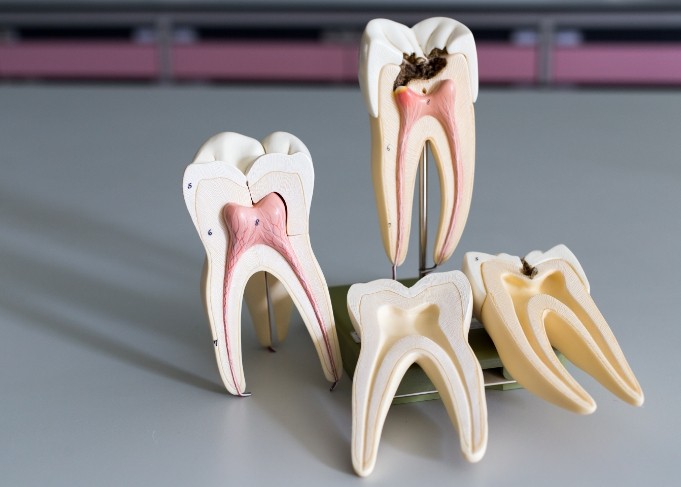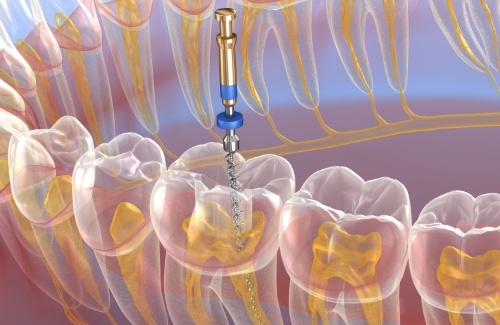Root Canal Treatment – West Jordan, UT
Let Us Take Away the Pain

Our team at Frandsen Dental of West Jordan wants all patients to understand that root canals do not cause pain. This common falsehood causes many to avoid treatment altogether until they eventually succumb to tooth loss or extreme infection. Instead, this common procedure actually relieves pain by removing infection and saving teeth from possible extraction. So, if you are experiencing intense pain caused by a damaged or decayed tooth, we invite you to call us so that you can undergo a thorough examination to determine if root canal treatment in West Jordan is necessary to save your smile.
Why Choose Frandsen Dental of West Jordan for Root Canal Treatment?
- Natural Restorations Used to Protect Treated Teeth
- Enhanced Digital Imaging Used In-Office
- Dental Team That Puts Patients First
Do You Need Root Canal Treatment?

There’s a common misconception that you only need a root canal if your tooth hurts. That’s not the case. After all, if left untreated for long enough, the infection can “kill” the nerve, resulting in you not feeling any pain or discomfort. That’s why it’s important to look for other warning signs of severe dental damage, including:
- Persistent dental sensitivity
- A pimple-like bump on your gums
- Dark discoloration on the tooth
- Red, inflamed, or bleeding gums
If you experience these abnormal dental symptoms – or any others – then contact our West Jordan dental team ASAP to schedule an emergency exam.
The Root Canal Process

This is a multi-step process that many patients claim causes no more discomfort than a dental filling. Designed to eliminate pain caused by an infection within the innermost layer of a tooth, a root canal is a worthwhile procedure for anyone who wants to save their tooth and avoid costly replacement options.
After administering local anesthesia and isolating the tooth with what is known as a dental dam, the dentist will create an opening at the top of the crown so that they can access the inner layers. Once they reach the pulp, our dentist will remove it before clearing out other areas of decay, including within the canals.
We will then fill these areas with a substance known as gutta-percha so that the tooth remains sealed off from harmful bacteria. After some time, a custom dental crown will be placed on top to add a protective layer to your affected tooth.
The Benefits of Getting a Root Canal

We began this page with one of the biggest benefits of root canal treatment: it doesn’t hurt! However, that’s just one of the many “pros” of this emergency dentistry service. It also has a high success rate, the restoration placed over your tooth won’t draw any unwanted attention to your smile, and the results can last for well over a decade with the right best practices in place. Plus, if you’re nervous, we can add sedation dentistry to your treatment plan, ensuring you don’t feel any stress, worry, or anxiety in the treatment chair.
Understanding the Cost of Root Canals

Several factors can affect the cost of your root canal in West Jordan, but don’t worry. We outline these factors below so you can be well-informed, and after a consultation, our team will be able to give you a more precise estimate. If your wallet will need a boost to afford your treatment, we can also review your payment and financing options.
In the meantime, feel free to continue reading and learn more about the cost of root canals.
Factors That Can Affect Root Canal Cost

At Frandsen Dental, we personalize each patient’s root canal treatment plan to best suit their unique needs and oral structure. This means no two root canals are exactly the same, and your final price could be affected by:
- The location of your afflicted tooth. Molars, for example, are trickier to clean out. Performing a root canal for back teeth is likely to cost more than front teeth.
- The severity of your situation. Dental infections can vary in complexity, and if your case is severe, there could be more expenses associated with your treatment.
- Restoration and other post-treatment services. Most patients require a crown after getting a root canal; any additional dental services should be factored into your budget.
Is it Cheaper to Pull My Tooth?

The immediate cost of extracting a troubled tooth might seem less expensive upfront. However, keep in mind that you would need a full replacement for your extracted tooth, and some false pearly whites have a higher price tag than root canal restorations. Postponing a dental replacement is generally not recommended, either, as your jawbone will start to deteriorate over time and your remaining teeth could shift or become crooked. Correcting these issues can also be costly!
Basically, in the long run, it’s better for your wallet to get a root canal.
Does Dental Insurance Cover Root Canals?

Yes, though it depends on your policy. We encourage patients to double-check the details of their plan to confirm their coverage. That said, our team would be happy to help you navigate the specifics of your dental insurance benefits! We’re in-network with many major plans and are familiar with how benefits can be maximized.
Other Options for Making Root Canal Treatment Affordable

If you don’t have access to dental insurance, you’re not out of luck. We recognize that this isn’t an option for everyone, and are proud to offer other options that can help you save money on your treatment, such as:
- In-House Membership Plan. Sort of like dental insurance, opting into our membership plan entitles you to certain discounts on our services. We won’t require you to hit a deductible or meet a waiting period, though!
- Cherry Financing. Cherry is a trusted third-party financer. We partner with them to enable patients to apply for monthly payment plans with little-to-no interest. Essentially, you could pay at your own pace!
We try to make the dental experience as stress-free as possible, so if you have questions or concerns about root canal costs, please let us know!
Root Canal Therapy FAQs
How Long Does It Take to Recover from a Root Canal?
People tend to heal at varying rates, but most patients feel well enough to return to work or school within a day or two of their root canal procedure. However, if your job requires strenuous physical exertion, you may need to take at least 2 – 3 days off.
Your mouth may be sore for several days. Pain relievers can help to mitigate any discomfort. You should also eat a soft diet and be sure to stick to a thorough but gentle oral hygiene routine.
If you notice any severe pain or other unusual symptoms, contact us right away for assistance.
How Much Pain Is Normal After a Root Canal?
The root canal procedure itself should be very comfortable. However, some soreness is normal during the recovery period. There should be no extreme pain, but mild soreness and sensitivity are to be expected. These may go on for multiple days, though most people are back to feeling fairly normal within a week.
You should avoid doing anything that could worsen your discomfort. For example, you should not eat hard foods. It can also be helpful to take pain relief medications.
How Long Do Root Canals Last?
Root canal therapy has an impressively high success rate. Under the right circumstances, your results should be permanent!
Of course, it must be acknowledged that in some cases, root canal treatment fails. This can happen if you unnecessarily delay getting a crown for your treated tooth, you are not diligent about oral hygiene, or an accident happens that injures the tooth. In rare cases, a root canal fails because the original treatment was not as thorough as would have been ideal.
What Happens if You Wait Too Long for a Root Canal?
Root canal therapy is meant to get rid of infected or damaged tissue within a tooth. Since teeth cannot heal themselves, such problems are only likely to worsen if timely treatment is not provided. In fact, if you wait too long, root canal therapy may no longer be a viable option. We may determine that the best course of action is to completely remove the tooth.
Also, please note that if your toothache goes away without treatment, that is not necessarily a good thing! It may mean that the nerve in your tooth has died. The original infection could still be causing damage to your oral tissues.
Can Root Canals Be Prevented?
In most cases, the need for root canal therapy can be prevented if you take some simple steps:
- Maintain a thorough daily oral hygiene routine.
- Visit our practice twice a year for a checkup and cleaning.
- If you notice a minor dental problem, visit us for treatment before your symptoms become severe.
- Eat a balanced, nutritious diet.
- Wear a mouthguard when you play sports.
- If you grind your teeth at night, use a nightguard to prevent damage to your smile.
